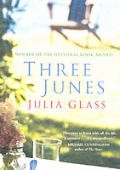
On the recommendation of a friend, I read Julia Glass's novel, Three Junes. It's a departure from what I normally read, but it was an enjoyable and quick read. It's told in three parts, by three different narrators.
The first section of the book, which was originally published as a novella, was narrated by newly widowed Paul McLeod. A newspaper publisher from Scotland, Paul is traveling through Greece on a tour. Along the way he forms a strange bond with an energetic woman who acts like a den mother and he finds himself attracted to a much younger American art student, Fern. However, Fern's attentions are drawn to the travel guide, John. The most memorable part of Paul's passage, was when one of the woman mentioned that he wasn't buying any souvenirs or taking any pictures. Paul said he took the trip to lose memories, let them go, not make new ones.
Paul's oldest son Fenno narrates the second section of the novel. Fenno, who is gay, guides us through the deaths of his mother and more recently his father. A bookstore owner and caretaker for a friend dying of AIDS, Fenno journeys back and forth from Scotland to New York; from artist lover to deathly ill friend; from pedigree dogs to parrots. Glass's description of the epidemic of AIDS was well constructed, showing the reader the demise of a once active man's body. Fenno's friend, Malachy "Mal" Burns, may be Glass's strongest character. His dry wit and biting observations, make the dying music critic a strong focal point to Fenno's sometimes undefined life. Mal's seeming courage in the face of death has just enough sentimentality to sustain the emotion.
In the third sections, Glass returns to Fern to lead us home. Fern is now in her mid thirties, also a widow and now pregnant with her new boyfriend's baby. The entire episode takes place in a summer house, in which her friend Tony is house sitting. Drawing the story together, Tony is Fenno's former lover and house sitting for Fenno's friend and business partner. When Fenno shows up at the house unexpectedly, he and Fern are drawn to each other, building and an immediate relationship. Fern even says that if it were ten years ago, she would have fallen in love with him. But perhaps she still has. Perhaps this is the friendship we all look for, but seldom find.
Glass manages to intertwine the lives of numerous, mostly fully realized characters. And though the story itself centers on predictable themes of love, death, birth and hope, Glass is able to make them her own. And because of that, we are grateful readers.
Now reading:
David Liss A Conspiracy of Paper
Listening to:
Travis Invisible Circus
No comments:
Post a Comment